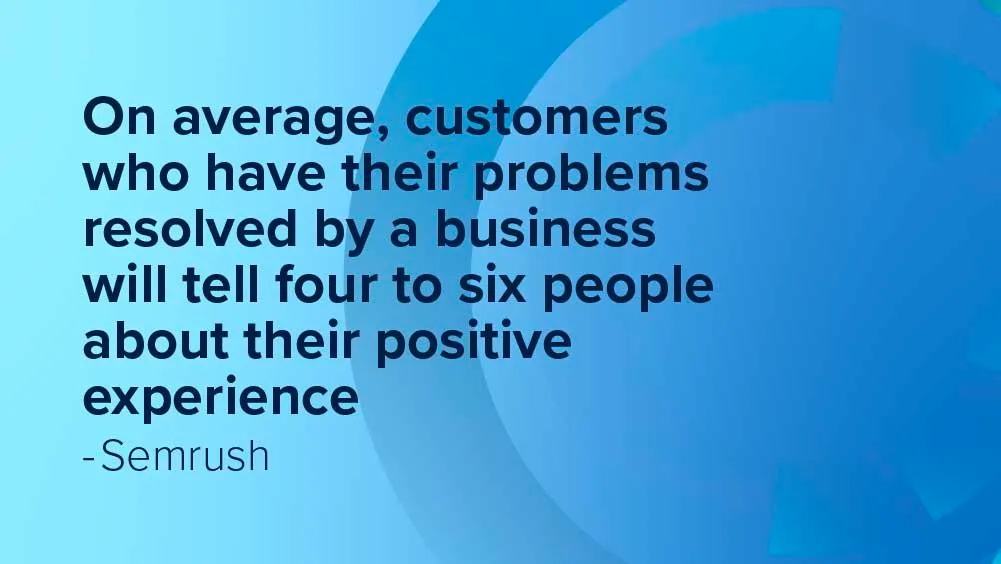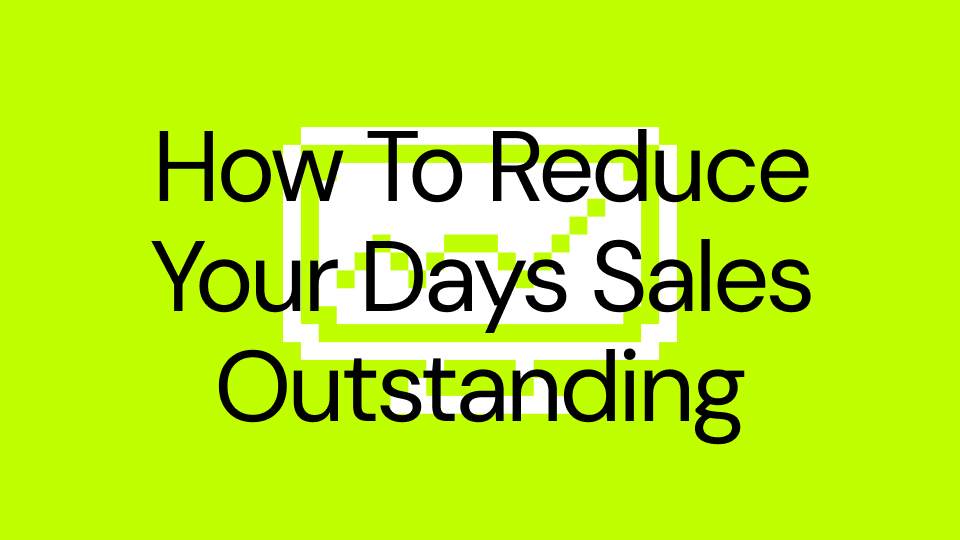25 ways to build and retain trust with your clients

Trust is developed through hundreds of small actions. Learn 25 ways to help build it.
Trust is the assured reliance on the character of your business. Are you truthful with your promises and provide the expertise your clients expect?
We want to help you achieve a high level of trust, as how you build and keep trust will define the long-term success of your business.
It can become tempting to focus on the shiny new customers and forget about nurturing your current clients. If you successfully establish trust with your clients, they will become your biggest marketing asset through advocacy for your business.
Your current clients are your greatest marketing asset
Word-of-mouth is even more effective than paid ads, resulting in five times more sales.
So, how can you use this to your benefit? Turn your current clients into advocates by building and maintaining trust with them. If your clients trust you, they will feel confident referring your services to others in their industry.
Negative experiences with your business can undo any sales and marketing efforts in record time. 26% of people will avoid a brand if their friend or family tells them a negative story about their experience.
Don’t underestimate the impact of trust in your client relationships.
To support you in creating positive experiences for your clients, we have a list of 25 ways to build and retain trust with them.
Our 25 tips to build and keep trust with your clients:
1. Be consistent with your communication
Use simple and engaging language, avoiding jargon and ambiguity, and providing relevant and timely information. Remember, the most important thing isn’t sounding smart, slow down and ensure your clients actually understand what you’re saying. You want them to leave meetings understanding clearly what you’re going to be doing and why, without ambiguity.
2. Take accountability for any mistakes
Mistakes happen and the way you react shows your clients a glimpse into your true character. No one likes people who deflect and point fingers when something goes wrong. You don’t want your clients to think you’ll do the same to them if push comes to shove. Honesty builds trust, so front-footing any mistake and addressing them head-on shows you’re a trustworthy person.

3. Use fair judgement
Trust also depends on how consistent and fair you are in your decision-making. You need to apply the same standards and expectations to yourself and others and avoid favouritism or bias. You also need to follow through on your commitments and actions and hold yourself and others accountable for the results.
4. Take pride in the quality of your work
Take this approach to everything you do. Pride in your work means doing the right thing even when no one is watching. For me, having pride in my work means that if I see a piece of paper on the office ground, I pick it up. Simply because it is the right thing to do and I have pride in the place I work. This attitude builds trust with clients as they understand you’ll do right by them even when they aren’t watching.
5. Demonstrate expertise and knowledge
This one isn’t a quick fix. Developing your expertise takes time and commitment. If you do work you love this should come naturally but not without challenge. Challenge yourself to branch out and do things that make you feel slightly uncomfortable because they are new to you.
In terms of things you can do right now, do your research on your customers before you meet with them to show you understand and value their business.
6. Respond quickly to client concerns

If you want your clients to trust you, be there for them when they need you. If a client messages you with a concern, don’t ignore their message for hours. Respond when you get a chance and if their concerns are more than just a small question, organise a time to talk face-to-face or on Zoom. They will feel valued by your business when you take their concerns seriously and are willing to do what it takes to resolve them.
7. Walk the talk
If you tell your clients you’re able to do something, you better be sure you can. Don’t overpromise. Be honest with the services you can provide and those you don’t. Being honest with your customers will always pay off better than overpromising.
8. Honour commitments
Not following through on your commitments will quickly make your clients lose trust in you. If you say you’ll do something, do it. Otherwise, be realistic with your timelines and come to your clients in advance if you can see you won’t be able to deliver on time. Using a PSA system will significantly help you do this.
Looking for expert advice on attracting the right clients for your firm?
Visit our academy to browse the free courses we offer consulting firms.

9. Go above and beyond your client's expectations
Remember what we told you about word-of-mouth marketing? Think about what you would want your current clients to say to potential new customers. Don’t be overly protective with your time when it comes to delivering beyond client expectations. If you see some additional value you could create for your clients in an hour of non-billable time, consider doing it as it will pay dividends by keeping them coming back and referring your services to others.
10. Show appreciation to your long-term clients
There are ways you can show appreciation in your everyday interactions by thanking your clients for their time and their continued business. Express to them that you enjoy working with their company if you genuinely do. Other ways to show you appreciate them could be giving them discounted rates on future projects or free added extras. You could also organize some goodies (chocolate, champagne, flowers, etc.) sent to their office to celebrate your working relationship and show appreciation for their support at the end of a project.
11. Actively listen to your client's requirements
People can tell if you are looking through them waiting for your turn to talk. When your customers talk - listen. You’ll be able to execute their project better because you’ll understand their requirements, and they will feel valued and trust that you understand them.
12. Offer social proof through case studies or quotes

This is a simple but effective way to increase trust with current and future clients. Ask clients to leave you reviews on your website or review sites. If a project went practically well, you may even want to write down a case study outlining the challenge, solution and result delivered to the client. As mentioned above people trust others' opinions, even strangers.
13. Look your client in the eyes
Eye contact has many positive effects on relationships, both personal and professional. It demonstrates confidence and openness, which can foster a trusting relationship with your clients. If you avoid looking your clients in the eyes they will subconsciously feel you are trying to hide something from them and distrust you.
Eye contact can be challenging if you are a shy person. Remember it’s not a staring contest, leave your eyelids comfortable, and break contact periodically. A natural way to break eye contact is when you’re thinking of an answer, you can look up to the left or right side of your vision.
Keep in mind: In some cultures avoidance of eye contact is customarily a gesture of respect. Ensure you have a good level of cultural competency and can adapt based on your clients. Keep in mind that you may mistakes when using cross-cultural communication, this is normal for everyone, what matters is respecting your clients enough to learn about their customs to try and bridge the communication gap.
14. Listen to any poor experiences they may have had with consultancies in the past and ensure they feel understood
Most of your clients will have worked with all sorts of contractors during their careers. They will have also had mixed experiences that tint the way they see their relationship with you. Some clients will want to tell you about a negative experience. Subconsciously they will be looking for you to empathise with them about what happened so that they know you also think it’s bad, and therefore wouldn’t do something similar. This might all sound like “mind games”, but it’s normal for there to be subtext under casual conversation. Listen, use empathy, and make them feel heard.
15. Trust your client's expertise and judgement
Your clients are experts in their own domain. Giving them your trust will help them trust you back. Ask for their feedback periodically and build an open dialogue about the project with them.
16. Collaborate with other trusted brands
If you have connections with other trusted brands, the trust they have built with their clients can rub off on you by association. Release a co-written blog post, a Q&A video or a dual-service offering to further build trust in your workplace.
17. Have an opinion and stand by it
If you express an opinion don’t flip-flop on it, it makes you seem untrustworthy and like you’ll say whatever needed to get by. Great leaders earn the respect and trust of others by having conviction. This, however, doesn’t mean bulldozing other's ideas, you can always learn and evolve your understanding of something, but be purposeful with how you stand on issues you feel strongly about.
18. Use humor (where appropriate)

When you’re working alongside your clients, you’ll get to know them and be able to gauge if they like to make jokes. Bounce off their energy and make kind-hearted jokes. A kind-hearted joke would be joking about how meticulous your client is with their business, and a no-go would be joking about your client having a bad financial quarter. Joking appropriately with your clients will make them feel comfortable around you and build trust.
19. Give proper credit where it is due
People who give proper credit to others in their team exude an air of confidence. They are the types of people we want to be friends with - selfless, thoughtful and secure. Seeing you being a team player instils trust in your character.
20. Don’t always be selling
There’s a time and place for making deals. Remember this, and instead focus on what value you can provide to your clients, rather than how much you hope for them to pay you. It seems disingenuous to be trying to upsell your clients, but seems helpful when you provide them with legitimate solutions to their problems.
21. Find things you have in common with your clients
You’ll find the more you talk about the differences you have with your clients, the harder it will be to make a connection with them. In casual conversation find something in common with them - maybe they went to the same university, like bright coloured ties, enjoy classical music, whatever it is - find it and talk about it. This works because we trust people we like, and we like people that we can find something in common with.
22. Act on any feedback they give you, and thank them for negative feedback
The average customer who has a bad experience tells eight to 16 people about it.
Negative feedback is a blessing. It gives you a chance to respond to it and redeem your services in the eyes of your client behind closed doors. If you make it uncomfortable to provide your business with negative feedback, it could instead end up on your Google business or Facebook page. Listen to your clients, and give them the psychological safety to provide all their feedback, and show they can trust you by making actionable changes.
23. Use warm non-verbal ques
We’ve all heard the statistics on how much of our communication is body language. So we’ll cut to the chase, here are some examples of trustworthy body language:
- Mirroring - most people naturally do this, if someone smiles at you, you smile back.
- Sit up straight - you’ll look more confident, roll your shoulders back and know that you’ve got this!
- Smile - a genuine smile signals to others that you are approachable and kind. When you smile, don’t “drop” it quickly, let it fade. When you drop your smile quickly it looks like a fake smile which has the opposite effect.
- Keep your hands visible (especially the palms) - we subconsciously see this as non-threatening. Many guides will also say to keep your hands still, however, this can be challenging for neurodivergent people, so do your best but don’t stress over it.
- Don’t cross your arms - crossing your arms makes you look closed off and signals to your clients that you aren’t warm or open. This isn’t the trust-building cue you want to communicate.
24. Embrace diversity and foster an inclusive environment
Clients will come to your business with backgrounds from all over the world. This is an exciting opportunity for you to learn from your clients and understand their perspectives. This should go without saying, but you want to be fostering an inclusive environment for ALL your clients. It takes active work to create a place where people feel comfortable to be themselves without judgment. Put in this work because your clients are worth it.
On top of this, you need to walk the talk by championing inclusivity not only in words but in actions. Look for diversity and inclusivity when hiring and taking on new projects.
25. You can’t fake trust, you need to be genuine and have a purpose.
Why do you show up to work? Identify what your purpose is and infuse it into everything you do. Having a purpose that your clients can see and connect to, helps them build trust in your company's brand.
CEO and Strategic Communications thought leader Judy Schramm shares this advice about building purpose and trust with your clients:
“You also want to talk about your mission and vision. What are you trying to accomplish? When people feel like they understand what you are trying to do and why it matters to you, they’re more likely to engage in your mission and feel connected to it.
When you are transparent about what you want, it makes you more human and approachable. You don’t have to be perfect or hide your flaws — tell people what to expect and what you need. When you create transparency and show vulnerability, that builds trust” - Three Powerful Ways to Use LinkedIn to Build Trust.
Building trust with your clients should be your top priority
The significance of trust in business cannot be overstated. It serves as the cornerstone upon which lasting and meaningful relationships are built. Your commitment to honesty, accountability, and consistent communication forms the bedrock of trust with your clients.
The power of word-of-mouth, proven to be five times more effective than traditional advertising, highlights the impact your current clients can have on the growth and success of your business. Trust is a delicate yet formidable asset; it takes time to build, but its benefits are immeasurable.

.png)

